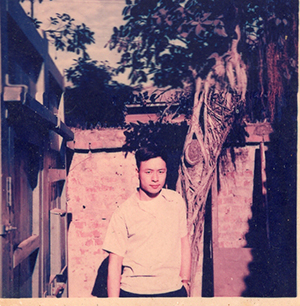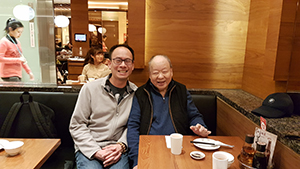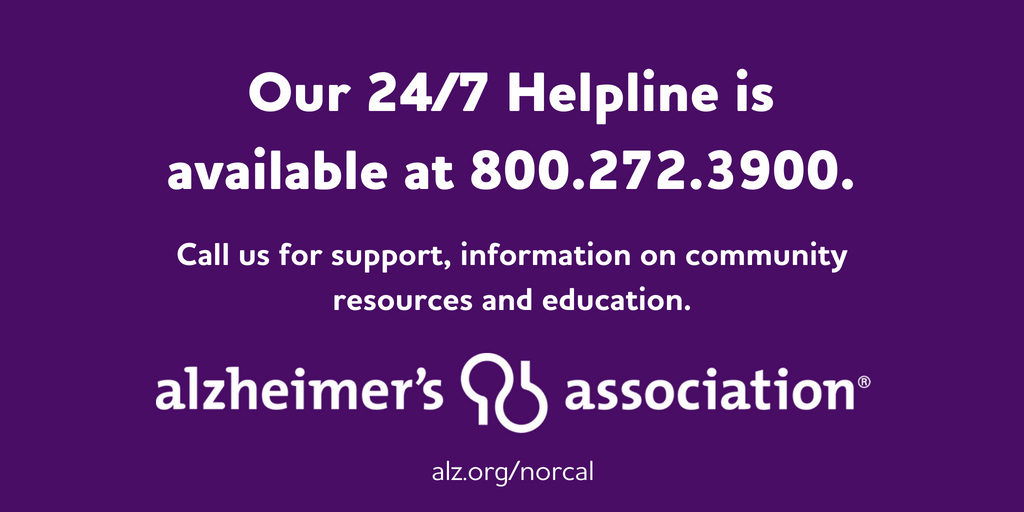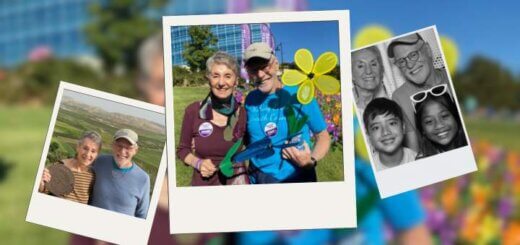Long distance Asian caregiver makes hugs a priority
By Malavika Raj
Andy lived 6,000 miles away from his father who had dementia. As the primary caregiver, Andy spent 20 years flying back and forth to Taiwan to care for his father. With the support of the Alzheimer’s Association®, Andy changed his whole perspective on how to care for his father and prioritized making memories for himself.

Doing what was best for his father
Andy’s father, Frank, lived by himself in Taiwan. Having served in the Navy, routine was important to him. Upon his retirement, he hired a man to help him with daily tasks. “Dad had a strict routine,” said Andy. “He ate at a certain time and got up a certain time. He was always thinking far ahead.”
For Andy, it was a priority to keep his father comfortable and happy, despite the circumstances. After looking into moving him into a retirement home, Andy’s father decided it was not the best fit for him. “He looked at homes in the area and he wanted to live in the same home he’d lived in for 25 years,” says Andy. “I did everything in my power to keep him there because I wanted him to be happy.”
The first signs
While Frank was never formally diagnosed with dementia, he had started to show signs of cognitive impairment. He told Andy stories about the gentleman he hired stealing his stuff, but the stories didn’t make any sense. At this point, the gentleman had been working with Frank for several years. Andy knew the man would never do what he was being accused of.
A few years later, Andy flew to Taiwan to visit his father. They went to a restaurant that Frank visited routinely. “The people at the restaurant knew him,” said Andy. “They’d bring him a menu and ask him what he’d like to order. A few minutes later he’d ask, “˜what did I order?’ or “˜I still need to order.'”
Andy knew it was time to take action when some family friends called him to let him know that his father had not shown up to their house for a visit. “We got a call from one of our family friends,” said Andy. “My dad took a cab. The driver called the family friends and said, “˜I have a passenger and I can’t find you.’ It turns out he had gone to the place where they used to work together instead of their home.”
Taking care from afar
Andy, who lives in the United States, couldn’t just stop by his father’s house to help out when his father needed him. With the help of technology, Andy decided to install cameras in his father’s home, allowing Andy to monitor him from thousands of miles away.
“I was always afraid of something happening to him in the house alone,” said Andy. “I Installed cameras in his house, with his permission.” At first, Andy installed cameras in the living room but added more around the house as years went by. Andy said, “I also added motion sensor lighting so when he walked out of his bedroom the floor would light up and I added grab bars in the bathroom and along walls.”

Stigma
In some Asian cultures there is a stigma surrounding dementia. They view it as something shameful. While this may not have been entirely true for Andy, he still kept the information from his extended family. “I never told anyone,” Andy says. “I did it out of respect for my dad. I did not want their pity.”
Although stigma was one of the reasons Andy did not want to disclose his father’s situation to others, he was also worried for his father’s safety. Especially because he was living on his own. “I didn’t want anyone taking advantage of him because he lived alone,” Andy said. “This was one of the reasons why I had cameras installed. With the cameras, I knew who came and went and what they said. In general people in Taiwan are very kind, but it’s always good to be careful.”
Asking for help
Andy first heard about the Alzheimer’s Association through a coworker who was participating in Walk to End Alzheimer’s®. He learned about the Alzheimer’s Association 24/7 Helpline (800.272.3900) which is available around the clock, 365 days a year. Through this free service, specialists and master’s-level clinicians offer confidential support and information to people living with the disease, caregivers, families and the public.
One day, after being physically and mentally drained from being a long-distance caregiver and working full time, he called the 24/7 Helpline for support. “I finally decided to call the Helpline,” said Andy. “They connected me with a woman. I told her about how my dad is far, and that it’s been difficult for me to handle this stuff.”
Andy received encouragement and advice from the woman he spoke with. The most important thing he learned was that in order for him to continue to support his father, he needed to take care of himself as well. “You realize it’s okay to take care of yourself,” said Andy. “When you take care of yourself, you’ll have more energy to take care of others.”

Making time for what is important
Before calling the 24/7 Helpline, Andy would spend the entire day with his dad, from the moment his dad woke up until his dad went to bed. Andy’s only break was a quick lunch. After learning the importance of self-care, Andy changed the way he spent time with his father.
“I started taking a longer lunch,” said Andy. “I’d take two hours and when I came back, I could spend more time chatting with him and watching TV. It changed my mental state and reset how I looked at things. I started to ask myself what memories do I want to have with him?”
Andy considers his family to be very traditional, which to him, means that you don’t hug your parents. Especially your father. However, Andy decided he wanted to have a memory of giving his father a hug. “I wanted a real hug. An American style hug.” said Andy. “We got to the airport and he would shake my hand and say, “˜thank you, thank you, thank you.’ I said, “˜Dad, I’m going to give you a hug. Arms open, I’m coming in. It was the most beautiful moment.”
Andy continued to hug his father every time he saw him.
A company who cares
Andy had been traveling back and forth from the United States to Taiwan to care for his father for more than 20 years. Andy said, “Over the last 20 years or so, I was flying back and forth three to four times a year to see him. In the end I was going once a month.”
Because of his needs, when Andy was applying for his current job, he made it very clear that he would need to travel to see his father. His now boss was very supportive of his situation. “When I interviewed for the job, one of the stipulations was that I would get to see my dad every other month,” said Andy. “My boss agreed right away. When you give employees an opportunity to take care of their own families, that’s awesome.”
Andy, who works for Randstad, a human resource consulting firm, is grateful for the support he received from them. Andy says, “They’ve been the most supportive. Not just the company but also my coworkers.”

Frank’s fall
In late November 2019, the caregiver that worked for Frank the past 20 years, got sick and had to leave. Andy, who had just returned home from his last visit the week prior, quickly hopped on a plane back to Taiwan to take care of his dad and look for a new caregiver.
In early December, Andy’s brother came out to take care of their dad so Andy could return home. A week later, Frank fell and was admitted into the hospital. Shortly thereafter, he slipped into a coma. Frank passed away at the age of 88.
Sharing your story to raise funds
In the midst of a pandemic, Andy has been able to successfully raise $1,100 for Walk to End Alzheimer’s using Facebook fundraiser. In his fundraising campaign, he wrote about how we wanted to do something good for other people to honor his late father. People were quick to respond.
“The people who donated already knew my story,” shared Andy. “I didn’t want to pressure people to donate. I told them this was my first time doing this, and if they can donate, good. If not, all good.”
When the donations started coming in, Andy was surprised. He hadn’t expected such a response. “People wrote me notes,” shared Andy. “Coworkers I haven’t talked to in a long time sent me a thank you text. I got emails from someone whose dad had also passed with Alzheimer’s.”
Walk this year
This year’s Walk is different. We won’t be coming together in large groups like we’ve done in the past. Instead, you can participate on every sidewalk, track or trail in your community. Following CDC guidelines, we encourage you to wear your purple and walk with close friends and family on Walk day.
Andy plans to walk in this year’s Walk to End Alzheimer’s with his mother in Taiwan, in hopes to keep his father’s memory alive. “We’d like to walk around the neighborhood where my father and I used to walk in the mornings,” Said Andy. “It’s almost like having a part of him with us as we do the walk, and the perfect way to honor him.”
You can join Andy’s team, Cisco/Randstad East Bay or start your own team for the East Bay Walk to End Alzheimer’s on October 24. We’re still coming together in 2020, even if it means trying something new. Learn about Walks in your area at alz.org/walk.
Leran more:

















